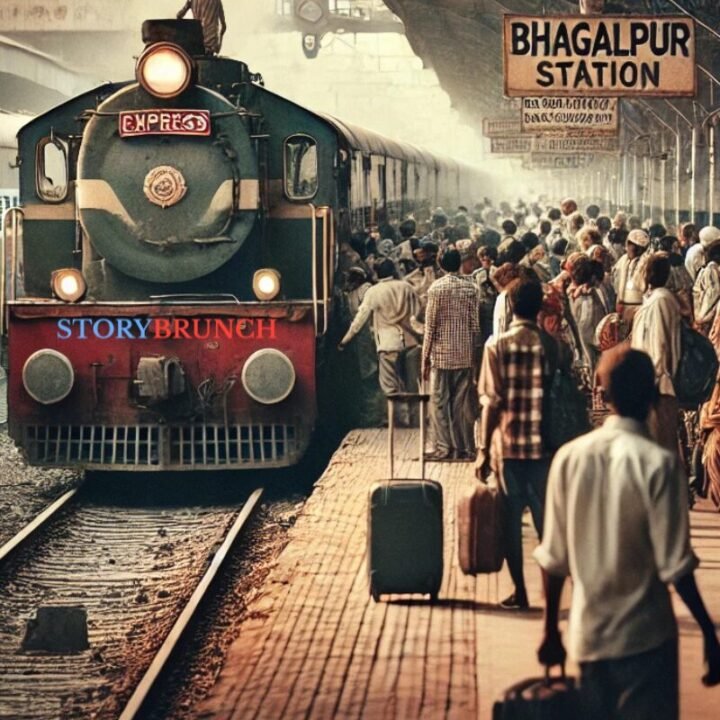Hope and Hardship on the Journey from Bihar to Delhi
Bhagalpur Station, Bihar— It is barely dawn, but the station swarms with people. Porters in faded red uniforms jostle for customers. The tinny echo of a loudspeaker announces train arrivals and departures, mostly drowned out by a relentless clamor of vendors hawking “Chai, Chai!” and families trying not to lose one another in the chaos. Outside, a pot-bellied policeman barks orders at a snaking queue of passengers waiting to board the general coach of the Magadh Express bound for New Delhi.
Among them stands Roopmati, a shy young woman from Baunsi village in Bhagalpur, her eyes wide in awe. It’s the first time she has ever set foot on a railway platform—or ventured beyond her home district. Newly married to Rupan Yadav, a daily wage laborer in Delhi, she can still feel the weight of her recent dowry: one lakh rupees in cash and a modest bicycle, the latter already stored somewhere in the jam-packed luggage compartment. The clamor around her is both frightening and exciting. She has heard stories of Delhi’s towering buildings, the endless hum of traffic, and the possibility of a new, freer life far from the fields and dusty roads of her village.
Rupan, standing behind her in the queue, tries to shield his bride from the shoving crowd. He works on construction sites and knows the harshness of city life. But he also dreams that, in Delhi, they can build a better future—perhaps live under a tarpaulin or in a makeshift tent near a building site for now, but eventually find something more stable.
Meanwhile, the policeman bellows, “Line mein raho! (Stay in line!)” People frantically shuffle forward as the train pulls in. A chaotic wave of human bodies surges through the doors of the general coaches. Roopmati and Rupan get swept along. As they scramble onto the coach, they catch a fleeting glimpse of the sleeper and AC compartments, their comparatively spacious interiors reserved for those who can afford a higher fare. Inside, men, women, and children are pressed into any available inch of space, from the floors to luggage racks overhead.
Rupan manages to wrangle a corner of a seat for Roopmati. She gingerly settles onto it, her bright red bangles jingling against the metal seat handle. Her wedding sari, slightly crumpled from the push and pull, stands out against the grimy brown upholstery. Rupan has no chance of sitting; he remains standing near the seat’s edge, clutching the steel bar for support.
Across from them sit five weavers, their conversation a gentle hum of camaraderie. One of them, Aslam Ansari, leads the group. Aslam already works for a garments manufacturer in Faridabad and has brought his cousins along for the first time. His plan is to help them land jobs in the same factory—or somewhere similar—through the kinship network that binds so many migrant laborers. An old holdall bag stuffed with their belongings rests beneath their feet, jostled by the swirl of passengers edging up and down the aisle.
At the other end of the crowded coach, Chanchal Kumar, a slender barber wearing a faded shirt, stands near the open doorway. His mobile phone blares classic 1990s Bollywood tunes, the tinny audio just audible above the din of hawkers, crying babies, and excited chatter. He closes his eyes briefly, perhaps reminiscing about a time when life was simpler, or at least more carefree. He used to watch these old Hindi films in the single-screen theaters of his hometown in Bihar, but life in Delhi is expensive, and the multiplexes feel out of reach. He had come home to celebrate Diwali with his aging parents, and now the time has come to return to his cramped barbershop job in the city.
Nearby, a weary-looking woman named Chameli Devi sits on the floor of the aisle, her two children huddled close. She is divorced, abandoned by a husband who descended into alcoholism and left her to raise their children alone. Her son, barely seven, clings to her arm, while her fifteen-year-old daughter, Suman, gazes at the coach’s metal ceiling with a distant, vacant look. Suman suffered a bad fall from a swing in her childhood and has since been prone to sudden spells of unconsciousness—something the local doctor in Chameli’s hometown couldn’t adequately treat. With money pooled from her brothers, Chameli is headed to Delhi, hoping to find better neurological care for Suman. Though she dreads the unknown costs of city life, the prospect of getting proper medical attention for her daughter has fueled her determination to make this journey, even if it means sleeping on station floors or cramped rentals until Suman improves.
Suresh occupies a small corner of a window berth, sharing it with six others. There’s barely room for him to shift, but he manages to peer out the window at the receding platform. His father was a carpenter in their village, and from him, Suresh learned the craft. A few years ago, he moved to Delhi to work at a furniture shop in Kirti Nagar, a bustling market for all things wood and décor. Now, as the train picks up speed, his reflection in the grimy window reveals uncertainty in his eyes. He often questions the decision he made: whether to remain in Delhi, where the money is better but life is hard, or to move back home and set up his own small business in the nearest town. The swirl of farmland and trees outside soon gives way to the outskirts of the city, and then it will be hours of slow progress before the capital, but Suresh’s thoughts remain clouded with indecision.
On the same berth as Roopmati’s, another woman, Manju is sitting by her side— both squeezed together by the crowd. Manju is a bright bundle of energy, chattering away about life in the Seelampur slums of Delhi, where she shares a tiny room with her husband, Gopi, and their two children. She is jubilant to be returning to the city; the village, for her, spells a heavy load of joint family responsibilities and constant scrutiny from in-laws. In Delhi, though cramped and harsh, she finds more personal freedom. Her husband, Gopi, stands beside her, a resigned look on his face. He loves the village—the slow evenings spent with friends at the edge of a canal, the quiet nights under a star-filled sky. But necessity has forced him to keep going back to Delhi, where daily wages are higher than anything the village can provide.
Their laughter and chatter resonate for a while, swapping tales about the long commute and shared cooking arrangements in makeshift homes. Then Manju drifts off to doze, leaning against Gopi’s shoulder, while Roopmati remains awake, reflecting on the conversation.
As the train lurches forward, the rhythmic clacking of wheels merges with the hum of conversations, mobile ringtones, and the occasional hawker’s call of “Moongfali, garam moongfali!” (Peanuts, hot peanuts!). Somewhere in the distance, a child cries inconsolably, while a group of students laugh over shared snacks. The acrid smell of sweaty clothes and the tang of the metal coach hang in the air, accentuated by the relentless push of bodies.
Roopmati looks both apprehensive and exhilarated. She tries to imagine her new life in Delhi, living in a tent near a construction site. She wonders if it will be something like the movies she has glimpsed on television back home—colorful lights, tall buildings, and wide roads.
She also imagines the loneliness: no farmland to walk through, no wide fields where she and her sisters once cut crops at harvest time.
Still, she draws hope from Manju’s chirpy stories, even if they are sprinkled with accounts of water shortages, frequent power cuts, and a lack of quality life in the slums.
As hours pass, conversations intertwine. Suresh shares a tiffin box of homemade parathas with the group; Aslam’s cousins unwrap a packet of litti-chokha brought from home. Rupan, sweaty and tired, stands guard to keep the seat for Roopmati. Gopi complains about how long the journey is, remembering the convenience of traveling by tractor or bullock cart back in the village—a trip that didn’t confine him to a steel box for hours on end. Manju shrugs off his complaints with a laugh, teasing him gently, “Shut up and eat. We’ll be in Delhi soon!”
Even the pot-bellied policeman who had corralled the line earlier meanders through the coach, glancing this way and that, occasionally helping keep the aisle clear. Outside, the Bihar countryside gradually transitions to farmland interspersed with small towns and roadside markets. Smoke from brick kilns and industrial units begin to dot the horizon the closer they get to major junctions.
At each stop, new faces pile in, while some weary travelers squeeze themselves out. With each station that slips by, the travelers grow more aware of the vast distance they’re covering—and the different worlds they represent, all converging in a single coach.
As dusk settles and the overhead lights flicker on, the Vikramshila Express rattles onward toward the metropolis. For Roopmati, Rupan, Aslam, Chanchal, Suresh, Manju, Gopi, Chameli and countless others in that jam-packed coach, the next few hours hold both discomfort and a strange shared sense of camaraderie. They are each on their own journey—some carrying hope for a better future, others burdened by compromise, and all bracing for the life that awaits them in the sprawling city they now head toward.
By morning, they will arrive in Delhi—each one stepping off the train into the frenetic pulse of the capital. For some, it will be a return to the daily grind; for others, a leap into the unknown. But for a few precious hours, they share a cramped, moving home on wheels, connected by the common thread of longing, necessity, and a flicker of hope.







